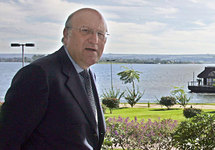
Mikati
"The rift between the (Hariri) alliance in Lebanon and Syria all these years did not prevent the latter from retaining its political hegemony over Lebanon."
Syria's political tug-of-war with Lebanon runs back decades. Damascus first sent its troops into its smaller neighbour in 1976, shortly after the outbreak of the 1975-1990 civil war, at the request of the Lebanese.
But Syria continued to wield its sway over Lebanon long after the war ended, maintaining a military presence until the 2005 assassination of ex-premier Rafiq Hariri.
The killing of Hariri -- father of the outgoing premier -- sparked a wave of mass protests which, combined with international pressure, forced the withdrawal of Syrian troops in April 2005.
Syria was initially accused of being behind the murder but has consistently denied involvement.
Saad Hariri's anti-Syrian alliance went on to win two legislative elections after Syria's withdrawal.
But the Saudi-backed Hariri was dealt a severe blow last month when a rival Hezbollah-led coalition backed by Syria and Iran toppled his government in a long-running feud over a UN-backed probe into his father's murder.
Hezbollah's leadership believes party members stand to be accused by the Special Tribunal for Lebanon (STL) and had been pressuring Hariri to cut all ties with the Netherlands-based court.
"The collapse of the Hariri government signals Lebanon's return to the pre-2005 era, and specifically to the 1990's," when Damascus reigned supreme over Beirut, said Salman Shaikh, head of the Brookings Doha Centre.
"Syria is making it known to the world that peace and stability in Lebanon cannot be preserved without its help."
All eyes now are turned to Najib Mikati, the billionaire businessman appointed -- with the blessing of Hezbollah and Syria -- to form a new government.
Mikati is a personal friend of Syrian President Bashar al-Assad and his appointment is widely seen as a sign that Damascus once again is pulling the strings in Lebanon.
"Syria has long recovered the self-confidence and composure it lost in the 2005 crisis," said Peter Harling of the International Crisis Group, adding that Syria had acted on "pragmatic political calculations."
"Syria arguably has the best hand ever -- combining the Shiites, the Druze, an important section of the Christians, and some key Sunni figures," Harling told AFP, referring to the Hezbollah-led coalition Damascus supports.
He added, however, that contrary to the pre-2005 era, Syria today had to take into account other players, notably Iran, Turkey, France and the United States."
The new government, experts say, will reflect the role Syria and other regional powers are set to play in Lebanon's future.
"Syria managed the Lebanese crisis to its advantage and placed both hands over Lebanon," Shaikh said.
"The question remains what lessons Damascus learned over the past few years and how that will be applied in the near future."
---------------------------------------------------------------------------------------
Syria's political tug-of-war with Lebanon runs back decades. Damascus first sent its troops into its smaller neighbour in 1976, shortly after the outbreak of the 1975-1990 civil war, at the request of the Lebanese.
But Syria continued to wield its sway over Lebanon long after the war ended, maintaining a military presence until the 2005 assassination of ex-premier Rafiq Hariri.
The killing of Hariri -- father of the outgoing premier -- sparked a wave of mass protests which, combined with international pressure, forced the withdrawal of Syrian troops in April 2005.
Syria was initially accused of being behind the murder but has consistently denied involvement.
Saad Hariri's anti-Syrian alliance went on to win two legislative elections after Syria's withdrawal.
But the Saudi-backed Hariri was dealt a severe blow last month when a rival Hezbollah-led coalition backed by Syria and Iran toppled his government in a long-running feud over a UN-backed probe into his father's murder.
Hezbollah's leadership believes party members stand to be accused by the Special Tribunal for Lebanon (STL) and had been pressuring Hariri to cut all ties with the Netherlands-based court.
"The collapse of the Hariri government signals Lebanon's return to the pre-2005 era, and specifically to the 1990's," when Damascus reigned supreme over Beirut, said Salman Shaikh, head of the Brookings Doha Centre.
"Syria is making it known to the world that peace and stability in Lebanon cannot be preserved without its help."
All eyes now are turned to Najib Mikati, the billionaire businessman appointed -- with the blessing of Hezbollah and Syria -- to form a new government.
Mikati is a personal friend of Syrian President Bashar al-Assad and his appointment is widely seen as a sign that Damascus once again is pulling the strings in Lebanon.
"Syria has long recovered the self-confidence and composure it lost in the 2005 crisis," said Peter Harling of the International Crisis Group, adding that Syria had acted on "pragmatic political calculations."
"Syria arguably has the best hand ever -- combining the Shiites, the Druze, an important section of the Christians, and some key Sunni figures," Harling told AFP, referring to the Hezbollah-led coalition Damascus supports.
He added, however, that contrary to the pre-2005 era, Syria today had to take into account other players, notably Iran, Turkey, France and the United States."
The new government, experts say, will reflect the role Syria and other regional powers are set to play in Lebanon's future.
"Syria managed the Lebanese crisis to its advantage and placed both hands over Lebanon," Shaikh said.
"The question remains what lessons Damascus learned over the past few years and how that will be applied in the near future."
---------------------------------------------------------------------------------------









 Home
Home Politics
Politics









